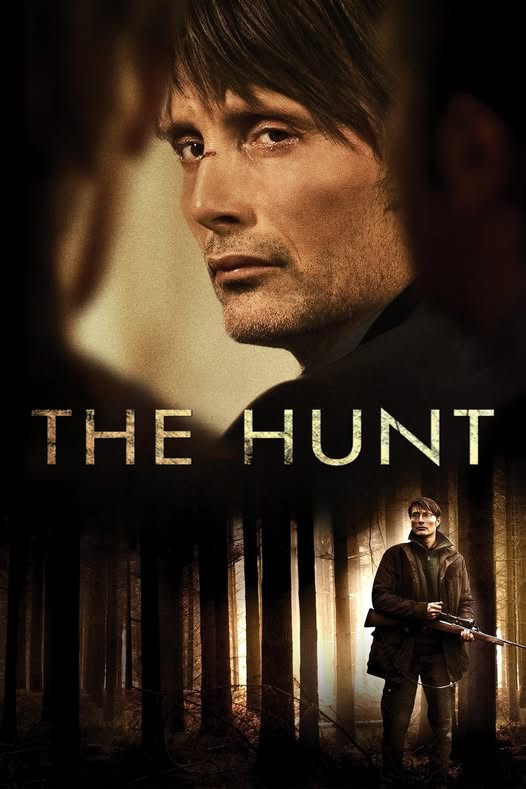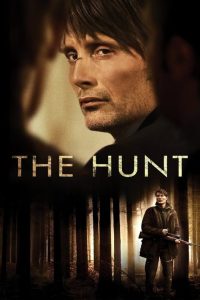The Hunt (2012)

The Hunt (2012) (Jagten in Danish) is a Danish psychological drama film directed by Thomas Vinterberg, starring Mads Mikkelsen in a remarkable performance. The film explores themes of false accusations, the power of rumor, and the devastating consequences of mob mentality. It is a tense and harrowing story about a man whose life unravels after he is wrongfully accused of a terrible crime.
Plot Overview:
The story centers on Lucas (Mads Mikkelsen), a kindergarten teacher in a small Danish town, who is falsely accused of molesting a young girl, one of his students named Klara. The accusation is based on a misunderstanding: Klara misinterprets a moment when Lucas gently rejects her affectionate advances and, in her confusion, accuses him of a crime. When the accusation spreads through the close-knit community, Lucas’s life is turned upside down.
As the lie begins to snowball, Lucas is ostracized, and his relationships with friends, family, and the community disintegrate. The film explores how quickly society can descend into hysteria when a single accusation is made, and how damaging and irreversible such accusations can be.

Key Themes:
Mob Mentality and Groupthink: The film is a chilling examination of how a community can be swept up in collective hysteria and how truth can become irrelevant when people are emotionally invested in a narrative. Lucas’s accuser, Klara, is a child, and the community’s response is one of outrage and righteous indignation, but it lacks any rational or evidence-based foundation. The film showcases how rumors can spiral out of control and how the truth becomes secondary to the emotional charge of the situation.
Innocence and the Loss of Trust: Lucas is a man who has worked hard to be a respected figure in his community. His innocence is gradually overshadowed by the weight of suspicion and the isolation that follows. The film illustrates how fragile trust is and how it can be easily destroyed, even when a person is innocent. The emotional devastation of being falsely accused is portrayed with brutal realism.
The Power of Children’s Words: The movie also looks at the power dynamics involved in children’s words. Children’s innocence is often perceived as unquestionable, but their misinterpretations or misunderstandings can lead to catastrophic outcomes. The film asks difficult questions about how society should react when accusations of this nature arise, especially when they come from a child.
Social Alienation: As Lucas’s life unravels, he faces intense social alienation. His friends turn against him, his former colleagues avoid him, and even his close relationships with his family are strained. The film examines how individuals can become pariahs in a society driven by fear and judgment, even when they are innocent.

Performances:
Mads Mikkelsen (Lucas): Mikkelsen’s performance is nothing short of exceptional. He portrays Lucas with a quiet dignity, and as the layers of his character are peeled back, Mikkelsen allows the audience to feel the character’s emotional turmoil. Lucas is a man who goes from being a respected member of his community to a pariah, and Mikkelsen captures the devastating toll the accusation takes on his psyche. His portrayal is both subtle and powerful, conveying the character’s inner conflict and helplessness without resorting to melodrama.
Thomas Bo Larsen (Theo, Lucas’s best friend): Larsen also gives a strong performance, as Theo is caught in the tension between loyalty to his friend and the social pressure from the community. His character adds a layer of complexity to the film, as his friendship with Lucas is tested by the accusations.
Annika Wedderkopp (Klara): As the young girl who makes the accusation, Wedderkopp gives a sensitive and nuanced performance. She portrays a child who doesn’t fully understand the consequences of her actions, but whose words set off a chain of events that ultimately spiral out of control.











